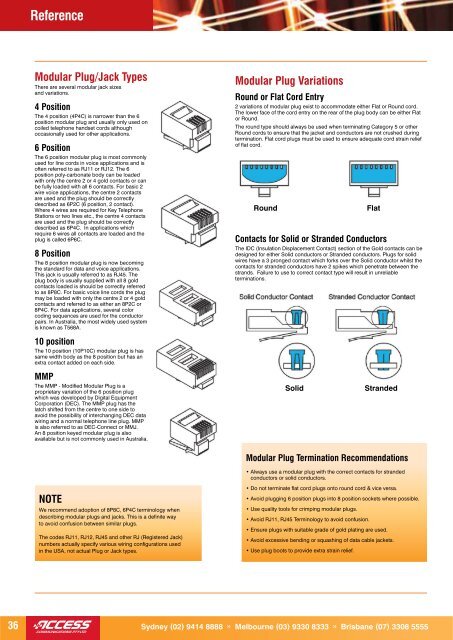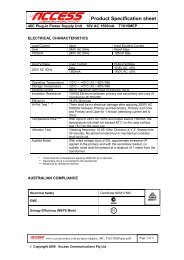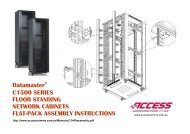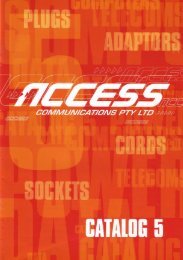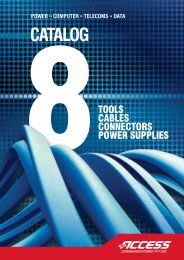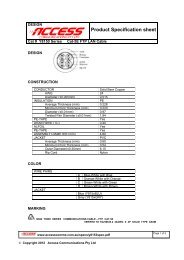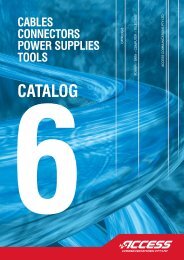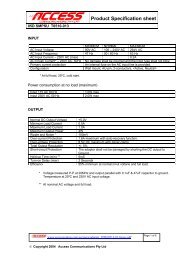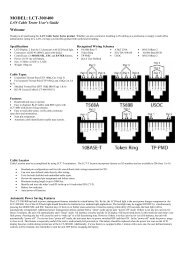Power computer telecoms data - Access Communications
Power computer telecoms data - Access Communications
Power computer telecoms data - Access Communications
You also want an ePaper? Increase the reach of your titles
YUMPU automatically turns print PDFs into web optimized ePapers that Google loves.
Reference<br />
Modular Plug/Jack Types<br />
There are several modular jack sizes<br />
and variations.<br />
4 Position<br />
The 4 position (4P4C) is narrower than the 6<br />
position modular plug and usually only used on<br />
coiled telephone handset cords although<br />
occasionally used for other applications.<br />
6 Position<br />
The 6 position modular plug is most commonly<br />
used for line cords in voice applications and is<br />
often referred to as RJ11 or RJ12. The 6<br />
position poly-carbonate body can be loaded<br />
with only the centre 2 or 4 gold contacts or can<br />
be fully loaded with all 6 contacts. For basic 2<br />
wire voice applications, the centre 2 contacts<br />
are used and the plug should be correctly<br />
described as 6P2C (6 position, 2 contact).<br />
Where 4 wires are required for Key Telephone<br />
Stations or two lines etc., the centre 4 contacts<br />
are used and the plug should be correctly<br />
described as 6P4C. In applications which<br />
require 6 wires all contacts are loaded and the<br />
plug is called 6P6C.<br />
8 Position<br />
The 8 position modular plug is now becoming<br />
the standard for <strong>data</strong> and voice applications.<br />
This jack is usually referred to as RJ45. The<br />
plug body is usually supplied with all 8 gold<br />
contacts loaded is should be correctly referred<br />
to as 8P8C. For basic voice line cords the plug<br />
may be loaded with only the centre 2 or 4 gold<br />
contacts and referred to as either an 8P2C or<br />
8P4C. For <strong>data</strong> applications, several color<br />
coding sequences are used for the conductor<br />
pairs. In Australia, the most widely used system<br />
is known as T568A.<br />
Modular Plug Variations<br />
Round or Flat Cord Entry<br />
2 variations of modular plug exist to accommodate either Flat or Round cord.<br />
The lower face of the cord entry on the rear of the plug body can be either Flat<br />
or Round.<br />
The round type should always be used when terminating Category 5 or other<br />
Round cords to ensure that the jacket and conductors are not crushed during<br />
termination. Flat cord plugs must be used to ensure adequate cord strain relief<br />
of flat cord.<br />
Round<br />
Flat<br />
Contacts for Solid or Stranded Conductors<br />
The IDC (Insulation Displacement Contact) section of the Gold contacts can be<br />
designed for either Solid conductors or Stranded conductors. Plugs for solid<br />
wires have a 3 pronged contact which forks over the Solid conductor whilst the<br />
contacts for stranded conductors have 2 spikes which penetrate between the<br />
strands. Failure to use to correct contact type will result in unreliable<br />
terminations.<br />
10 position<br />
The 10 position (10P10C) modular plug is has<br />
same width body as the 8 position but has an<br />
extra contact added on each side.<br />
MMP<br />
The MMP - Modified Modular Plug is a<br />
proprietary variation of the 6 position plug<br />
which was developed by Digital Equipment<br />
Corporation (DEC). The MMP plug has the<br />
latch shifted from the centre to one side to<br />
avoid the possibility of interchanging DEC <strong>data</strong><br />
wiring and a normal telephone line plug. MMP<br />
is also referred to as DEC-Connect or MMJ.<br />
An 8 position keyed modular plug is also<br />
available but is not commonly used in Australia.<br />
Solid<br />
Stranded<br />
Modular Plug Termination Recommendations<br />
<br />
conductors or solid conductors.<br />
NOTE<br />
We recommend adoption of 8P8C, 6P4C terminology when<br />
describing modular plugs and jacks. This is a definite way<br />
to avoid confusion between similar plugs.<br />
The codes RJ11, RJ12, RJ45 and other RJ (Registered Jack)<br />
numbers actually specify various wiring configurations used<br />
in the USA, not actual Plug or Jack types.<br />
<br />
<br />
<br />
<br />
<br />
<br />
<br />
36<br />
Sydney (02) 9414 8888 » Melbourne (03) 9330 8333 » Brisbane (07) 3308 5555


